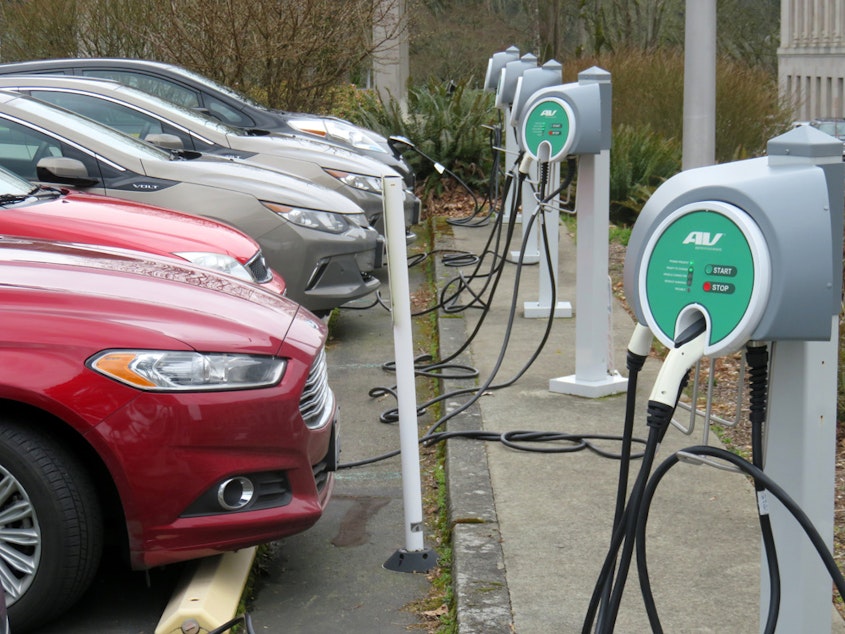Pay-per-mile tax gets test drive in Washington Legislature to augment gas tax

Washington state senators have teed up a mileage-based tax for electric and plug-in hybrid vehicles as the first step toward changing how the state pays for road maintenance and other transportation needs. Policymakers expect gas tax revenue to decline long term. Oregon has been experimenting with a per-mile charge for years.
Right now, Washingtonians who own fully electric cars pay an extra $225 annual registration fee. A proposal by state Sen. Rebecca Saldaña (D-Seattle) would replace that flat fee beginning in July 2026 with a mandatory 2 cents per mile road usage charge for electric cars and plug-in hybrids.
Electric car drivers could voluntarily opt in to the pay-per-mile system a year before it becomes mandatory if they figure it would save them money.
Saldaña said it was time to move into "the future of Washington travel" and road funding as she introduced the proposal to her colleagues on the state Senate Transportation Committee on Thursday.
"We know we've had a decreasing revenue source (gas tax) for transportation and increasing need for preservation and maintenance. So, I offer this up," Saldaña said.
Sponsored
The bill suggests drivers should have multiple options for how to report their mileage, but leaves the details to be worked out later. Saldaña said a GPS tracker with privacy safeguards is one option. A smartphone app might be another. Old school auto owners could potentially drive to an office for a yearly odometer reading.
Saldaña and committee chairman Sen. Steve Hobbs (D-Lake Stevens) portrayed the per-mile tax as a work in progress, worthy of investigation as a possible part of the long term solution.
"Doing nothing, that is not the answer," Hobbs said. "Right now, there is just a big, giant fee. Nobody likes that. If there is a way to be more fair about this by doing it by the mile, then we should attempt to do that."
Several Republicans on the committee voiced skepticism, especially in regard to the comparatively high cost of tracking the taxable mileage of individual drivers and collecting the resulting charges.
"It doesn't look like a real money maker," said Sen. Curtis King (R-Yakima).
Sponsored
Electric vehicle enthusiasts subsequently offered testimony for, against and with caveats.
"This taxation will hurt electric vehicle sales and damage Washington's future," said Ashly Knapp, founder of the website AutoAdvisor.com in Seattle. "Don't turn the odometer into a cash register."
The pay-per-mile proposal appears to face a bumpy road in the 2021 legislative session. Transportation Committee Chair Hobbs is the first co-sponsor of the bill, but he has not scheduled it for a vote ahead of a legislative deadline next Monday night for measures to advance out of committee.
Were the measure to pass, state Department of Licensing and legislative staff estimate about 142,000 vehicles would be affected in 2026.
Between 2018-19, the Washington State Transportation Commission oversaw a year-long, pay-by-mile pilot project which enrolled 2,000 drivers statewide. Project consultant Allegra Calder said an exit survey of the pilot project participants found a majority would prefer to fund transportation with a road usage charge where drivers pay by the mile.
Sponsored
Oregon leads the nation in rolling out the pay-by-the-mile alternative, having run several pilot road tests dating back more than a decade. It now collects real money from real world drivers who voluntarily opt in to pay by the mile.
Uptake in the OReGO program has been limited, though. Program participants in Oregon currently pay 1.8 cents per mile driven and get a credit for state gas taxes they pay at the pump. Out-of-state travel doesn't get billed.
Oregonians in the program track and automatically report their miles driven by plugging a device known as a "dongle" into their car's electronic controls. Spokesperson Michelle Godfrey with the Oregon Department of Transportation said the OReGO program had just over 700 participants as of late last year.
Godfrey said electric vehicle drivers could come out ahead under the pay-per-mile program because those who sign up escape a significant increase in annual car registration fees that took effect last year for highly fuel efficient autos.
"We're continuing to see enrollment increase," Godfrey said in an interview Thursday. "We're seeing more and more EVs sign up."
Sponsored
Meanwhile, ODOT is launching a new trial project in the Portland area this year to study whether additional highway funding models can be layered on top of the per-mile fee technology. With support from a federal grant, the study will test pricing that varies by time of day. It will also include an additional charge for driving on specific congested highways.
Oregon's gasoline tax is 36 cents per gallon. In Washington, drivers pay a 49.4 cent per gallon state gas tax that funds a wide range of transportation projects. The federal government charges an additional 18.4 cents per gallon.
This story has been updated.
Copyright 2021 Northwest News Network

